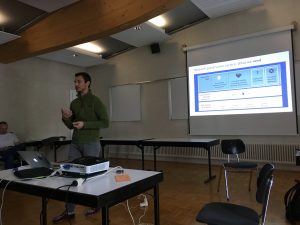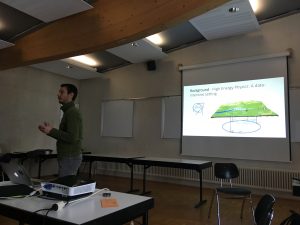In these sessions, PhD students presented and discussed their latest research projects and their vision for their dissertation projects.
Encouraging Compliance with Reproducible Practices in Science
 Sebastian Feger Sebastian Feger |
 CERN / University of Stuttgart CERN / University of Stuttgart |
 Mon, 12.03.2018 Mon, 12.03.2018 |
|---|
Reproducibility is a key requirement of experimental research, that allows to verify findings and represents a base for future work. To conduct reproducible research, scientists need to provide rich documentation of their work. Scientific tools are designed to support research communities in this process. Although they focus on easing compliance with reproducible practices, they often do not provide extensive strategies to motivate and reward scientists for undertaking the efforts. Our work aims at studying and contributing such motivational drivers.
Secure and Privacy-Respecting Ubiquitous Systems
 Mohamed Khamis Mohamed Khamis |
 Ludwig-Maximilians-Universität München Ludwig-Maximilians-Universität München |
 Tue, 13.03.2018 Tue, 13.03.2018 |
|---|
Users are nowadays surrounded by a plethora of ubiquitous devices that feature increasing computational power and a myriad of sensors and displays. This breakthrough in ubiquitous computing promises to bring a lot of tangible benefits to the user, but at the same time it comes with implications on the user’s privacy. The objective of this research is threefold: (1) to understand the privacy risks, needs and perceptions of under-investigated user groups, (2) to uncover the privacy implications of novel ubiquitous technologies, and (3) to accordingly create secure yet also usable privacy protection mechanisms that keep up with the novel threats imposed by advances in ubiquitous technologies.
Interaction and Haptic Feedback in VR
 Matthias Hoppe Matthias Hoppe |
 Ludwig-Maximilians-Universität München Ludwig-Maximilians-Universität München |
 Thu, 15.03.2018 Thu, 15.03.2018 |
|---|
As haptic feedback in VR is still lacking and interactions are limited, future systems should incorporate more accurate and fitting feedback and allow users to interact in an intuitive and comprehensive manner. Therefore, we explore concepts of how to make interaction and feedback in VR more immersive and allow experiences to induce a higher presence.
Emotion detection in driving
 Michael Braun Michael Braun |
 Ludwig-Maximilians-Universität München Ludwig-Maximilians-Universität München |
 Thu, 15.03.2018 Thu, 15.03.2018 |
|---|
As affective computing offers reliable emotion detection and personality traits of drivers can me estimated more effectively, car interfaces should benefit from these capabilities. Future systems should be aware of the state of the driver e.g. to try prevent road rage (which is a problem in the US). An emerging question is how we can effectively personalise the experience of interacting with a car. Can cars use digital assistants that have a user-specific personality? Further challenges include methods for conducting in-situ studies and identifying effective metrics.
Emotion-Aware Systems for Promoting Human Well-being
 Elena Di Lascio Elena Di Lascio |
 Università della Svizzera italiana (USI) Università della Svizzera italiana (USI) |
 Thu, 15.03.2018 Thu, 15.03.2018 |
|---|
Given the ubiquitousness and pervasiveness of mobile technologies, researchers are now able to gather large amounts of data in real settings and use it to build more accurate affect models. This enables the creation of emotion-aware systems able to sense, infer and promote emotional well-being in different contexts. Several challenges must, however, be tackled before these systems can be effectively used in real settings. We are currently focusing on the design, development and evaluation of emotion-aware systems considering particular use cases.
Perceiving and Understanding of Ambient Data Representations In the Home
 Alexandra Voit Alexandra Voit |
 University of Stuttgart University of Stuttgart |
 Fri, 16.03.2018 Fri, 16.03.2018 |
|---|
 Users have to deal with a lot of information sources in their daily lives. Nowadays, smart devices inform the users proactively about incoming messages, upcoming appointments or additional kinds of information such as news or weather information. On the one hand, users appreciate being proactively informed about this kind of information because they do not have to check different application manually anymore. On the other hand, receiving proactively delivered notifications cause negative effects such as distractions, interruptions or stress. Ambient displays have the potential to convey information to the users without grabbing their attention too much. An emerging question is how can we design and evaluate ambient displays that increase the awareness of the users regarding different sources of information (e.g., upcoming home tasks).
Users have to deal with a lot of information sources in their daily lives. Nowadays, smart devices inform the users proactively about incoming messages, upcoming appointments or additional kinds of information such as news or weather information. On the one hand, users appreciate being proactively informed about this kind of information because they do not have to check different application manually anymore. On the other hand, receiving proactively delivered notifications cause negative effects such as distractions, interruptions or stress. Ambient displays have the potential to convey information to the users without grabbing their attention too much. An emerging question is how can we design and evaluate ambient displays that increase the awareness of the users regarding different sources of information (e.g., upcoming home tasks).
Enhancing Virtual Reality Exposure Therapy
 Philip Schaefer Philip Schaefer |
 Hochschule Heilbronn (UniTyLab) Hochschule Heilbronn (UniTyLab) |
 Fri, 16.03.2018 Fri, 16.03.2018 |
|---|
Confrontation therapy is the preferred treatment method for anxiety disorders and can be done in virtual reality with the same success rate as in vivo. Using a large-scale motion tracking system, biofeedback sensors and other technologies, new possibilities are researched how to enhance virtual reality exposure therapy (VRET) beyond the current practice.
Cognition 2.0: Data-Driven Ubiquitous Computing for Augmenting Human Cognition and Perception
 Evangelos Niforatos Evangelos Niforatos |
 Università della Svizzera italiana (USI) Università della Svizzera italiana (USI) |
 Fri, 16.03.2018 Fri, 16.03.2018 |
|---|
 [
[ slides] Evolution has always been the main driving force of change for both the human body and brain. Presently, in the Information era, our cognitive and perceptive capacities cannot simply rely on natural evolution to keep up with the immense advancements in the field of Ubiquitous technologies, which remain largely uninformed about our cognitive states. As a result, a so-called “cognitive gap” is forming between the human (users) and the machine (systems) preventing us from fully harnessing the benefits of modern technologies. We argue that a “cognitive information layer”, placed in-between human and machine, could bridge that gap, informing the machine side about aspects of our cognition in real time (e.g., attention levels). In this talk, we present our vision for such a software architecture, we describe how it could serve as a framework for designing and developing cognition-aware applications, and we showcase some application scenarios as a roadmap towards human-machine convergence and symbiosis.
slides] Evolution has always been the main driving force of change for both the human body and brain. Presently, in the Information era, our cognitive and perceptive capacities cannot simply rely on natural evolution to keep up with the immense advancements in the field of Ubiquitous technologies, which remain largely uninformed about our cognitive states. As a result, a so-called “cognitive gap” is forming between the human (users) and the machine (systems) preventing us from fully harnessing the benefits of modern technologies. We argue that a “cognitive information layer”, placed in-between human and machine, could bridge that gap, informing the machine side about aspects of our cognition in real time (e.g., attention levels). In this talk, we present our vision for such a software architecture, we describe how it could serve as a framework for designing and developing cognition-aware applications, and we showcase some application scenarios as a roadmap towards human-machine convergence and symbiosis.












